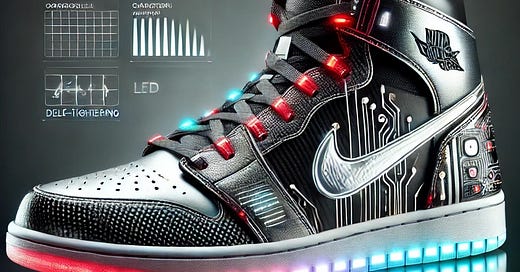Nike’s Air Jordan 1s basketball shoe is a quintessential example of brand power. It transcends mere footwear, embodying athleticism, success, and a unique cultural identity. This iconic product has transcended generations, maintaining its allure and desirability, demonstrating the enduring impact of a strong brand.
The 21st century has dramatically reshaped the brand landscape, thanks to the rise of the internet, mobile technology, and evolving consumer behaviors.
The internet has fragmented media, allowing consumers to curate their media diets and demanding targeted, personalized marketing strategies.
Social media has empowered consumers, offering them direct channels for engagement and feedback and introducing new marketing tactics like influencer marketing and user-generated content.
Mobile technology has created an "always-on" environment, demanding mobile-first strategies and location-based marketing.
Consumers must prioritize transparency, authenticity, and experiences over mere product ownership, forcing brands to adapt, innovate, and build strong customer relationships to thrive in this dynamic landscape.
Today, there are many celebrity-driven brands, each of which enjoys a significant market advantage. By leveraging the influence and endorsement of a well-known figure, these brands effectively bypass the consumer's decision-making process. Instead of relying on product information and personal preferences, consumers are subtly guided toward the product through their admiration or emulation of the celebrity. This dynamic can create a powerful sense of social proof and drive impulse purchases, giving celebrity-backed brands a distinct edge in the competitive marketplace.
This also signifies the diminishing influence of the traditional advertising industry. For decades, advertising agencies effectively communicated product features and successfully positioned brands as essential components of consumer lives. However, the rise of social media and digital platforms has shifted the power dynamic, with consumers now playing a more active role in shaping brand narratives.
Last week, Omnicom and Interpublic Group (IPG) announced a $13 billion merger to create the world’s largest advertising holding company. The combined entity is expected to generate $25 billion in revenue and achieve $750 million in annual cost synergies. By merging the third- and fourth-largest bulk buyers of ad inventory, the move responds to increasing pressure from big tech and the rise of AI, aiming to accelerate innovation and leverage AI and data analytics. (Sources: here, here and here)
AI accelerates the shift from mass marketing to targeted engagement by enabling brands to leverage data analytics for precise insights into consumer behavior. This allows for highly personalized campaigns across digital channels, fostering one-on-one relationships.
AI-driven personalization tailors product recommendations, marketing content, and customer interactions. Automating tasks like content creation, ad targeting, and customer support frees up human resources for strategic efforts. Advanced AI chatbots provide 24/7 support, enhancing customer experience. AI empowers consumers to expect greater brand transparency, authenticity, and ethical practices. Companies that provide engaging and trustworthy experiences are more likely to achieve lasting success.
Startups and Branding These Days
Startups often place brand-building lower on their list of marketing priorities, focusing instead on more immediate needs like top- (ToFu) and bottom-of-funnel (BoFu) activities, content creation, digital marketing, and sales enablement. These elements are critical for economically driving initial growth and securing early customers, making them seem far more urgent in the company's early stages. However, as a startup matures, founders and marketing professionals orbiting the company begin to realize the crucial role that a strong brand plays in differentiating the business and in its long-term success.
A well-developed brand in the age of AI enhances the company's overall value by creating positive associations with the company name, its products or product lines, and its thought leadership efforts. It’s just harder to do today.
Note: Brand equity fosters trust, differentiation, and customer loyalty, which can significantly improve marketing efficiency and sales outcomes over time.
The challenge isn't that startups fail to recognize the importance of brand-building, nor is it necessarily a lack of resources to invest in branding. The core issue lies in prioritization and the founder’s perception of when branding becomes essential. In pursuing immediate results, founders may delay brand-building efforts, missing the opportunity to lay a foundation that could amplify all other growth initiatives. Balancing short-term needs with long-term brand strategy is key to sustainable success.
Conclusion
In the Age of AI, startups must invest early in branding and adapt to a landscape where consumers demand personalized engagement, authenticity, and transparency. By harnessing AI in their digital marketing and branding activities, successful startups can forge stronger brands and build deeper connections with prospects and customers, staying relevant and resilient in an ever-changing marketplace.




